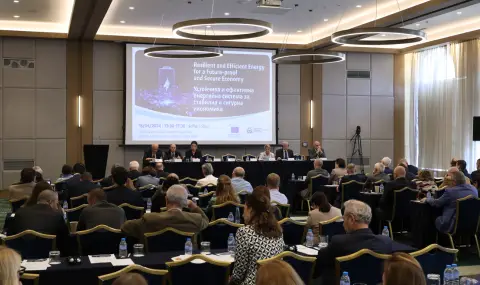„The security and availability of energy are an important prerequisite for having a competitive European industry. There cannot be a competitive industry without secure energy supplies at competitive prices, said the Chairman of the Board of the Association of Industrial Capital in Bulgaria, Vasil Velev, during the high-level conference "Sustainable and efficient energy system for a stable and secure economy".< /p>
The economy of the European Union (EU) has not been developing dynamically enough recently, and this is evidenced by the results of last year, as well as the forecasts for this year. "Gross domestic product growth has recently been in the range of 0% to 1%, while in the US it is between 2% and 3%, the Russian Federation is 3% and above 3%, China between 4% and 5%, India &ndash ; 6%-7%," Velev pointed out.
In his words, in the last 5 years, Europe has further reduced its share in the world economy. In addition, the share of government expenditure of European countries is growing. "That is, there is a falling share in the economy and a growing share of state and social spending," commented Velev. According to him, there are many reasons for this. Among them are the demographic crisis, the lack of sufficient personnel from engineering specialties and the regulations.
The Chairman of the Parliamentary Committee on Energy, Delyan Dobrev, stated that for about a year, the Electricity System Operator (ESO) has been working on the idea of introducing a flexible connection scheme. He explained that in Bulgaria, if energy from wind and sun is combined at one point, they will "interact" only 2 percent of the time. Therefore, a mechanism is now being worked on to allow the network to become denser without having to expand it.
In the National Assembly, and in particular in the Energy Commission, not even half of the results would have been achieved if it were not for the support of business and Bulgarian employers.
„A sustainable and efficient energy system is a prerequisite for stable economic development. The Ministry of Innovation and Growth has a significant resource to support the sector. Only in sync with business can the opportunities be realized as efficiently as possible," stated the Minister of Innovation and Growth Rosen Karadimov.
In his words, in the next 5 to 7 years, our country will mobilize a resource of 3.2 billion euros under various programs and projects, which may also include activities related to the promotion of the use of hydrogen technologies, so as to support the decarbonization of the Bulgarian economy.
„There can be no meaningful transition without the participation of the national development bank. This is the case in all developed countries, and this is what we are trying to do, I think successfully. The Bulgarian Development Bank (BDB) not only can, but must be an active partner in Bulgaria's energy strategy, because the BDB has a resource that can be used, said Tsanko Arabadzhiev, member of the Board of Directors and executive director of the BDB.< /p>
He added that the work on drafting an agreement between BDB and the European Commission on the InvestEU program is about to be completed. Through it, BBR will be able to issue guarantees for Bulgarian business. The size of the portfolios that will be created under the InvestEU program will be in the order of BGN 2.7 billion. About 60% of these guarantees will be for energy efficiency, energy production, RES.
In the project of Bulgaria's energy strategy, an undisputed priority is the guarantee of energy security in the context of decarbonization goals with the ultimate goal of achieving, in the long term, secure supplies at affordable prices for all consumers. This was said by the acting Deputy Minister of Energy, Iva Petrova.
Regarding energy production, the draft strategy envisages the continued introduction of RES combined with new flexible low-carbon capacities. The priority of the strategy clearly focuses on RES – from sun and wind, but also from hydropower resources, drew attention to Petrova.
